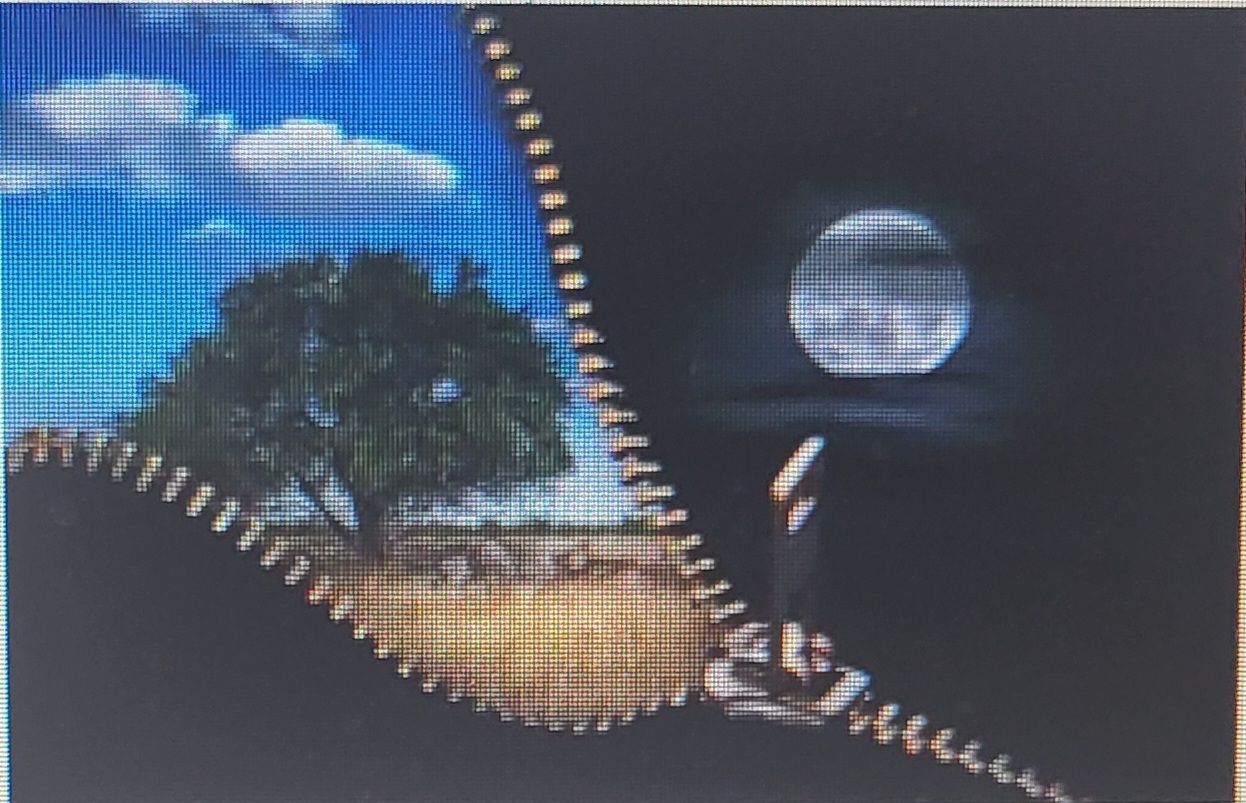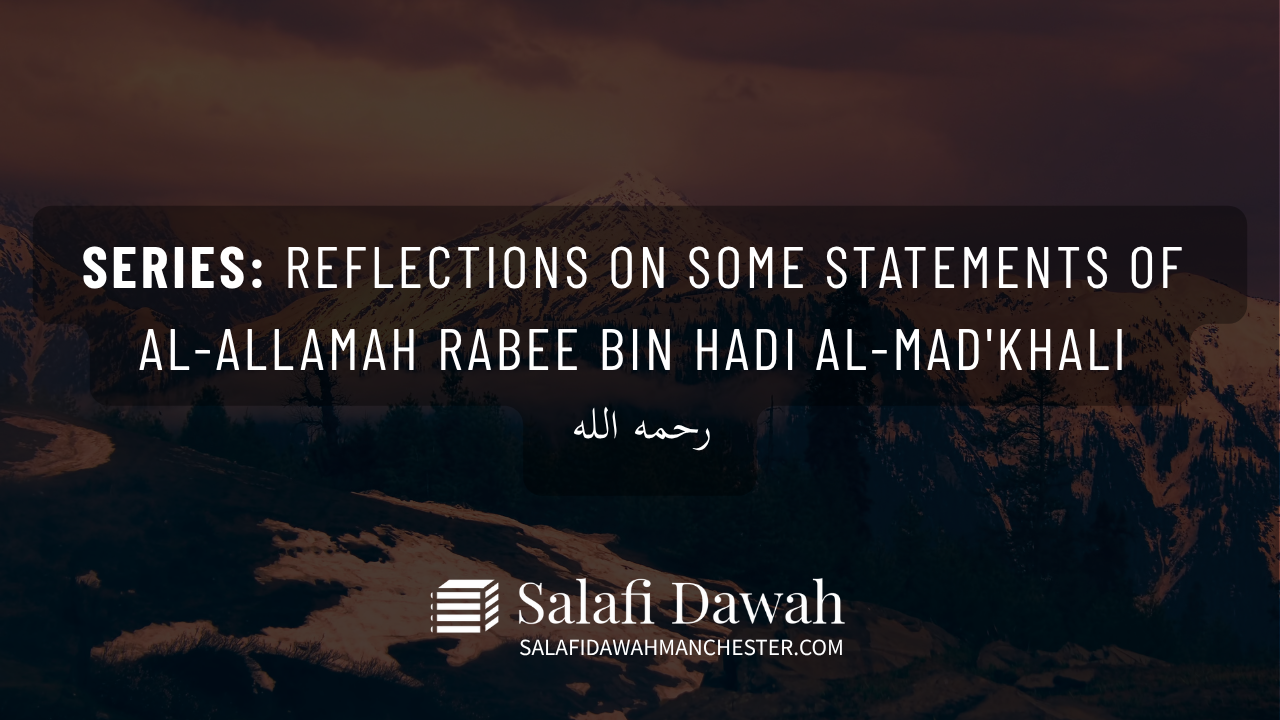In The Name of Allah, The Most Merciful, The Bestower of Mercy.
Before I begin this specific article, I want to make it clear that its aim is to defend the honour of a brother. The Messenger, peace and blessings of Allah be upon him, stated:
“Whoever defends the honour of his brother, Allah will protect his face from the Hellfire on the Day of Resurrection”. (Sahih Sunan at-Tirmidhee 1931)
I ask Allah for sincerity in this matter and hope He rewards me for this effort, as well as everyone else who stands up for others upon truth, Amin. The individual I am defending has not requested my support, nor have I informed him of my intention to do so.
Furthermore, some of those people targeting the victim are people I have known personally for many years and remaining silent may make them think that their ongoing attacks – even after the victim has openly defended himself in the most beautiful manner with proof- can carry on with impunity. However, even if they continue, they know that their deed is openly rejected by one who was close to them. Finally, as you can see this is simply a personal defense – neither in the name of the Masjid Account nor in the name of any group of people. To proceed:
Shaikh Al-Islam Ibn Taymiyyah, may Allah have mercy upon him, said:
ﻭﻟﻴﺲ ﻟﻠﻤﻌﻠﻤﻴﻦ ﺃﻥ ﻳﺤﺰﺑﻮﺍ ﺍﻟﻨﺎﺱ
ﻭﻳﻔﻌﻠﻮﺍ ﻣﺎ ﻳﻠﻘﻲ ﺑﻴﻨﻬﻢ ﺍﻟﻌﺪﺍﻭﺓ ﻭﺍﻟﺒﻐﻀﺎﺀ،
ﺑﻞ ﻳﻜﻮﻧﻮﻥ ﻣﺜﻞ ﺍﻷﺧﻮﺓ ﺍﻟﻤﺘﻌﺎﻭﻧﻴﻦ ﻋﻠﻰ
ﺍﻟﺒﺮ ﻭﺍﻟﺘﻘﻮﻱ ﻛﻤﺎ ﻗﺎﻝ ﺗﻌﺈﻟﻰ
وَتَعَاوَنُوا عَلَى الْبِرِّ وَالتَّقْوَى وَلا تَعَاوَنُوا عَلَى الإثْمِ وَالْعُدْوَانِ
وليس لأحد منهم أن يأخذ على أحد عهداً بموافقته على كل ما يريده وموالاة من يواليه ومعاداة من يعاديه،بل من فعل هذا كان من جنس جنكز خان وأمثاله الذين يجعلون من وافقهم صديقاً واليا، ومن خالفهم عدوَّا باغيا، بل عليهم وعلى أتباعهم عهد الله ورسوله بأن يطيعوا الله ورسوله ويفعلوا ما أمر الله ورسوله ويحرموا ما حرم الله ورسوله ويرعوا حقوق المعلمين كما أمر الله ورسوله، فإن كان أستاذ أحد مظلوماً نصره، وإن كان ظالماً لم يعاونه على الظلم بل يمنعه منه كما ثبت في الصحيح أنه قال:
(انصر أخاك ظالماً أو مظلوماً. قيل: يا رسول الله: أنصره مظلوماً فكيف أنصره ظالماً؟. قال تمنعه من الظلم فذلك نصرك إياه).
وإذا وقع بين معلم ومعلم أو تلميذ وتلميذ أو معلم وتلميذ خصومة ومشاجرة لم يجز لأحد أن يعين أحدهما حتى يعلم الحق، فلا يعاونه بجهل ولا بهوى، بل ينظر في الأمر، فإذا تبين له الحق أعان المحق منهما على المبطل سواء كان المحق من أصحابه أو أصحاب غيره، وسواء كان المبطل من أصحابه أو أصحاب غيره، فيكون المقصود عبادة الله وحده وطاعة رسوله واتباع الحق والقيام بالقسط
قال تعالى
يا أيها الذين آمنوا كونوا قوامين بالقسط شهداء لله ولو على أنفسكم أو الوالدين والأقربين، إن يكن غنياً أو فقيراً فالله أولى بهما، فلا تتبعوا الهوى أن تعدلوا وإن تلووا أو تعرضوا فإن الله كان بما تعملون خبيراً
It not allowed for the teachers to initiate (illegal) partisanship between the people and do that which would cause enmity and hatred between them; but rather they should be brothers who cooperate upon righteousness and piety, as Allah [The Exalted] said:
وَتَعَاوَنُوا عَلَى الْبِرِّ وَالتَّقْوَىٰ ۖ وَلَا تَعَاوَنُوا عَلَى الْإِثْمِ وَالْعُدْوَانِ
Help you one another in Al-Birr and At-Taqwa [virtue, righteousness and piety]; but do not help one another in sin and transgression]. [Al-Ma’idah. 2]
It is not allowed for anyone of them to receive a pledge from anyone to be in agreement with him in everything he wants – having allegiance to the one he is allied to and enmity against the one he harbours enmity, and whoever does this is similar to Genghis Khan and his ilk (in this affair), who take as their loyal friends the one in agreement with them and the one who oppose them as a rebellious enemy; rather it is obligated on them and their followers (i.e. the teachers) to fulfil the covenant of Allah and His Messenger by obeying Allah and His Messenger, doing that which Allah and His Messenger have commanded, declare unlawful that which Allah and His Messenger have declared unlawful, and preserve the rights of the teachers in the manner commanded by Allah and His Messenger. So, if one’s teacher is oppressed, he should help him; but if the teacher is the oppressor, he should not aid him in his act of oppression; rather he forbids him from it, as it has been established in the authentic books of hadeeth that the Prophet [peace and blessings of Allah be upon him] said, “Help your brother, whether he is an oppressor or he is an oppressed one. People asked, “O Allah’s Messenger! It is all right to help him if he is oppressed, but how should we help him if he is an oppressor?” The Prophet said, “By preventing him from oppressing others.” [Sahih Al-Bukhari 2444]
If an argument and dispute occurs between a teacher and another teacher, or between a student and another student, it is not permissible for anyone to help one of them until he knows the truth – neither to aid him based on ignorance nor desires; rather he he examines the affair, so if the truth becomes clear to him, he helps the one who deserves to be helped (due to him being upon the truth) against the one upon error – regardless whether the one who deserves to be helped is one of his companions or the companion of someone else, or whether the one upon error is one of his companions or the companion of someone else. Therefore, the aim is only to worship Allah alone, obedience to Allah’s Messenger, adherence to truth and establishment of justice. Allah [The Exalted] said:
يا أيها الذين آمنوا كونوا قوامين بالقسط شهداء لله ولو على أنفسكم أو الوالدين والأقربين، إن يكن غنياً أو فقيراً فالله أولى بهما، فلا تتبعوا الهوى أن تعدلوا وإن تلووا أو تعرضوا فإن الله كان بما تعملون خبيراً
O you who believe! Stand out firmly for justice, as witnesses to Allah; even though it be against yourselves, or your parents, or your kin, be he rich or poor, Allah is a Better Protector to both (than you). So follow not the lusts (of your hearts), lest you may avoid justice, and if you distort your witness or refuse to give it, verily, Allah is Ever Well-Acquainted with what you do. [Surah An-Nisaa. Ayah 135] [Majmu Al-Fataawaa. 28/15-17. paraphrased]
Al-Allamah Rabee Bin Hadi Al-Mad’khali, may Allah have mercy upon him, said:
The seeker of truth is not diverted from the truth, fairness and justice due to admiration of the big personalities and being amazed by them, for indeed the truth is more worthy to be followed. It is not permissible to drop the proofs for the sake of this or that great man. The principle [rule] of the Muslim – the unbiased one, the seeker of truth – is always:
[قُلْ هَاتُوا بُرْهَانَكُمْ إِن كُنتُمْ صَادِقِينَ -Say, bring forth your proofs if you are truthful]. [Surah An-Nahl. Verse 64] [Al-Mulakh-khasul Jameel Fee Bayaan Manhaji Ash-Shaikh Rabee Fid-Da’wati Wal-Jarhi Wat-Ta’deel. Page 87]
I present the disagreement between these two individuals who are familiar to me and many others. In this brief article, I remind myself about honestly putting aside personal biases, attachments to one or the other, preferences or aversions towards either party, familiarity with one over the other, or who holds the higher status in various regions. Instead, I should pay close attention to the documentation regardless of who is being or has been supported by individuals with titles such as Shaikh, Al-Allamah, or Mufti. The aim should be solely to examine the evidence and ask Allah sincerely to enable one to follow proof and help one another upon righteousness and piety. Read here: https://abuiyaad.com/w/arafat-lies
Now, with regards to some of those people whose twitter accounts have become a tool for diverting attention from the main issue- may Allah rectify their affair and not allow us to adopt their way in dealing with this issue- who are well known to me, I remind myself and them of the hadith in which the Messenger, peace and blessings of Allah be upon him, said:
“Indeed, I am only a human being and you people (i.e. disputants) come to me with your disputes. And it may be that one of you can present his case more eloquently than the other and I consider him truthful, and judge in his favour. So if I ever judge and give the right of a brother to his brother, then it is a piece of hellfire and let him not take it”.
Some Benefits Derived From This Hadith
The Ummah (i.e. the Shariah Judges) judge based on what is apparent; however, the judgement of a judge cannot prohibit the lawful and allow the unlawful (i.e. when proven erroneous).
This Hadith contains a refutation against those who say that the Messengers possess knowledge of the unseen.
This hadith also shows that speech can be seen to be true based on what is apparent, but it is truly falsehood concerning what is hidden within it.
This hadith shows that the one who receives a judgement in his favour is more aware than every other person of whether he is entitled to it or a falsifier. So, he takes if entitled or leaves it if he is a falsifier because, in reality, a judgement cannot change an affair from what it was in origin (i.e. the original truth in the affair before its distortion or concealment].
This hadith shows the sinfulness of the one who argues based on falsehood until he receives what he wants publicly, whilst he is upon falsehood.
This hadith is proof to show that a scholar can make a mistake and it is a refutation against those who say that every Mujtahid is correct. This hadeeth shows that the Mujtahid is forgiven (when he makes a mistake). [Sahih Al-Bukhaari. Kitaab Al-Ahkaam (Book of Judgements): Chapter 29. Hadeeth Number 7181 with Fath Al-Bari]
Imam Al-Khatib Al-Baghdadi, may Allah have mercy upon him, said:
There is no one among the people of hadith who showed favoritism (or behaved in a biased manner) in hadith — neither toward his father, his brother, nor his son. Ali ibn Abdillah Al-Madini, may Allah have mercy upon him, was an Imam of hadith in his era, however, not a letter is reported from him with regards to strengthening (the reliability of) his father; rather, the opposite of that is what has been narrated from him. [Sharaf Ashab al-Hadith p. 41]
Imam Ibn Hibban, may Allah have mercy upon him, said:
“Ali Ibn Al-Madini, may Allah have mercy upon him, was asked about his father, so he said: ‘Ask someone else’. They said: ‘We ask you (in particular)’. He lowered his head (in silence for a while), then he raised his head and said: “This is the religion, my father is weak (in hadith)”. [Al-Majruhin 2/15] [end of quotes]
Thus, we all need to scrutinise our intentions without any ulterior motives. These issues should not involve name-dropping, immunity, the misuse of influential figures, using prominent names to justify attacks on innocent individuals, or evading accountability, nor retaliating under the guise of genuine advice. All of this is detrimental as it blurs the distinction between right and wrong. The real question isn’t whether anyone stands with me, but rather sincerely asking Allah to protect us from harm and from causing harm to others.
Indeed, those whom Allah has blessed with maturity and honesty during every disagreement do not turn away from facts and continue attacking a person whose correct stance is the same as that of many others. But one may wonder, why all this venom against Shaikh Abu Iyaad, may Allah protect him? This is because, after the overwhelming proofs have been presented, those finding it hard to come to terms with it have now turned the matter into attacking symbols! Instead of adhering to the proofs, they think that Shaikh Abu Iyaad represents a group that threatens its narrative; thus, they attack him rather than address the main issue. This is because attacking a specific person is more emotionally satisfying than engaging with facts. In addition, it is as if Shaikh Abu Iyaad is responsible for that which their own hands have sent forth; thus, scapegoating him because, for them, being louder than him until the main issue is forgotten will solve the problem. It will note solve the problem, read here again: https://abuiyaad.com/w/arafat-lies
These people do not understand that this is not a struggle for influence or fame, nor should a person seek to merely belong somewhere through attacks, rather than asking Allah for guidance towards what is right, to evaluate proofs and adhere to them. Shaikh Abu Iyaad’s persistence upon what is right is commended, and regardless of the intensity of the attacks, neither he nor sensible and honest people will submit, even if the attackers use him as a convenient focal point for their anxieties that exist well beyond him.
So, finally, as for myself, I ask Allah to continue granting me and others the Tawfiq to distinguish between attack and proof, mere reaction and honest evaluation, neither uttering wild guesses nor fearmongering, neither name-dropping nor exaggeration, and nor uttering dubious analogies which the attackers have started using to liken Shaikh Abu Iyaad to Dr Muhammad Bin Hadi, may Allah rectify his affair. Rather, Shaikh Abu Iyaad was foremost in combatting the followers of Dr Muhammad. Read below:
https://www.manhaj.com/manhaj/articles/uyryh-documents-and-resources-for-countering-and-exposing-the-musafiqah.cfm
With the Tawfeeq of Allah, one adheres to the objective, preserve the credible proofs, only engage with clear goals, not play the personalisation game, or respond emotionally to give the attackers the desperate relevance they’ve been seeking. One should remain upon the proofs and not employ the useless snooker strategies of the attackers in seeking to divert attention from the tangible facts that are as clear as the mid day sun. One should engage in a productive manner and adhere to the proofs found here: https://abuiyaad.com/w/arafat-lies and give no attention to the useless relentless repetition against Shaikh Abu Iyaad.
Beware! Relentless Repetition Is Used Nowadays On Social Media to Propagate Misinformation
Gustave Le Bon, in his work “The Psychology of Crowds,” asserts that when we aim to gradually instill ideas and beliefs into the collective spirit of the masses, the methods employed by leaders vary significantly. They primarily resort to three fundamental techniques: affirmation, repetition, and contagion. While the impact of these methods may be slow, it is undeniably enduring. Political leaders advocating for a specific cause are well aware of the power of affirmation, just as industrialists recognise the importance of advertising their products. However, advertising only gains influence when coupled with repetition. Napoleon famously stated that there is but one serious form of rhetoric: repetition.
Repetition possesses a certain authority that influences rational and well-informed individuals. It allows ideas to embed themselves in the recesses of the unconscious mind, gradually transforming into beliefs that are accepted as truths, ultimately becoming self-evident realities. When these ideas solidify into truths through repetition, they can spread among the masses. For instance, any disturbance among a flock of sheep quickly affects the entire group. This does not require a singular point of origin; the revolution in France in 1848 began in Paris and swiftly extended to a significant portion of Europe, destabilising the monarchies in its wake. The repetition that leads to belief in a particular issue, and consequently its spread, poses a significant risk not only in imposing opinions but also in shaping thought processes, emotions, and feelings. As a result, one may observe that the masses at one point may disdain a certain literary work, only to later take pride in it after several years, or vice versa. This phenomenon can similarly be applied to ideas and beliefs. [The Psychology of crowds 132-136]
We ask Allah:
اللَّهُمَّ بِعِلْمِكَ الْغَيْبَ وَقُدْرَتِكَ عَلَى الْخَلْقِ أَحْيِنِي مَا عَلِمْتَ الْحَيَاةَ خَيْراً لِي وَتَوَفَّنِي إِذَا عَلِمْتَ الْوَفَاةَ خَيْراً لِي، اللَّهُمَّ إِنِّي أَسْأَلُكَ خَشْيَتَكَ فِي الْغَيْبِ وَالشَّهَادَةِ، وَأَسْأَلُكَ كَلِمَةَ الْحَقِّ فِي الرِّضَا وَالْغَضَبِ، وَأَسْأَلُكَ الْقَصْدَ فِي الْغِنَى وَالْفَقْرِ، وَأَسْأَلُكَ نَعِيماً لَا يَنْفَذُ، وَأَسْأَلُكَ قُرَّةَ عَيْنٍ لَا تَنْقَطِعُ، وَأَسْأَلُكَ الرِّضِا بَعْدَ الْقَضَاءِ، وَأَسْأَلُكَ بَرْدَ الْعَيْشِ بَعْدَ الْمَوْتِ، وَأَسْأَلُكَ لَذَّةَ النَّظَرِ إِلَى وَجْهِكَ وَالشَّوْقَ إِلَى لِقَائِكَ فِي غَيْرِ ضَرَّاءَ مُضِرَّةٍ وَلَا فِتْنَةٍ مُضِلَّةٍ، اللَّهُمَّ زَيِّنَّا بِزِينَةِ الْإِيمَانِ
وَاجْعَلْنَا هُدَاةً مُهْتَدِينَ
O Allah! By Your Knowledge of the unseen and by Your Power over creation, let me live if life is good for me, and let me die if death is good for me; O Allah! I ask You to grant me (the blessing of having) fear of You in private and public, and I ask You (to make me utter) a statement of truth in times of contentment and anger, and I ask You for moderation when in a state of wealth and poverty, and I ask you for blessings that never ceases, and I ask You for the coolness of my eye that never ends, and I ask You (to make me pleased) after (Your) decree; and I ask You for a life of (ease, comfort, tranquility, etc) after death; I ask You for the delight of looking at Your Face (i.e. in the Hereafter) and yearning to meet You without any harm and misleading trials (coming upon me). O Allah! Adorn us with the adornment of Iman, and make us (from those who are) guided and guiding (others). [As-Saheehah Number 1301]
The scholars say that these creations [i.e. Jibraa’eel, Meekaa’eel, Israafeel, the heavens, and the earth] have been specifically mentioned, even though Allah is the Creator of all the creation, just as has been established in the Qur’an and authentic Sunnah with regards to the specific mention of every created thing that has a great and mighty status as one of Allah’s creation, such as the statement, “Lord of the Heavens and the Earth”, “Lord of the Supreme Throne”, “Lord of the Angels and Jibreel”, “The Lord of the two Easts (places of sunrise during early summer and early winter) and the Lord of the two Wests (places of sunset during early summer and early winter)”, “The Lord of Humankind”, “The King of Humankind”, “The Only True God of Humankind”, “The Lord of all Created Things”, “The Lord of the Prophets”, “The Creator of the Heavens and the Earth”, “The Originator of the Heavens and the Earth” etc. All these things and what is similar to them show Allah’s Greatness, All-encompassing Power, and absolute Sovereignty. [Sharh Saheeh Muslim 5/50]
In this supplication, one employs the means of seeking Allah’s (love, aid, pleasure, assistance, etc) through belief and affirmation that He is the Lord – in general and specific – of these three Angels, who have been given a means of giving life. Jibra’eel is given the responsibility to convey the revelation (to the Prophets) by way of which the hearts and souls are given that type of life that necessitates the presence of sound belief in the heart that leads to all righteous deeds. Meekaa’eel is given the responsibility to bring the rain by way of which the earth, the vegetation, and animals are given life, and Israafeel is given the responsibility to blow the trumpet by way of which the creation is resurrected after their death. Also employing the means of seeking Allah’s (love, aid, assistance, pleasure, etc) through belief and affirmation that Allah alone is the Originator of the heavens and earth, meaning, He is their Creator and the one who brought them into existence prior to their non-existence, and that He is the knower of the unseen and the seen- meaning, the hidden and apparent, and because He alone is the One Who judges between the servants in that which they differ, so that He guides you to the truth in that which they differ. As for guidance, it is knowledge of the truth together with having the intent to follow the truth and preferring it over other things. The guided person acts upon the truth and desires it, and it is the Greatest blessing of Allah bestowed on the servants. We ask Allah to guide us all to the straight path and grant us every good. [An Excerpt from Fiqh Al-Ad’iyah Wal Ad’kaar 3/139-140]
We ask Allah to protect us and the attackers from useless and fruitless arguments after the proofs have been established. https://abuiyaad.com/w/arafat-lies
The Prophet, peace and blessings of Allah be upon him, said:
“The most hated of men in the sight of Allah is the one who is most quarrelsome”.
Al-Allamah Zayd Bin Hadi Al-Madkhali, may Allah have mercy upon him, said:
A warning against argumentation, falling into evil behaviour and its severe (consequences), especially if the argumentation is based on falsehood. As for when it is based on truth, there is nothing wrong with that for the one who has a right to do so; but he should be just in his argument so that he does not enter into oppression or error, and Allah knows best.
The hadith is a warning against lying during argumentation, falsehood and adorned speech until one changes falsehood into truth and truth into falsehood – not bothered about making an oath, lying or giving false witness. All this takes place from a person who is extremely quarrelsome, goes into excess in the matter and does not feel shy in the presence of Allah- neither fears punishment in this life nor in the next life. When it is the case that the extremely quarrelsome person is blameworthy, the person who has good conduct – if entitled to something – during an argument and other matters, will not utter except truth, and will not seek after anything except the truth- neither lies nor deceives the Shariah judge. This is from the characteristics of the people of Iman – those whom Allah praised in the Qur’an and the Prophet, peace and blessings of Allah be upon him, praised them in the pure Sunnah. (1)
Imam Al-Barbahaaree, may Allah have mercy upon him, said:
Al-Hasan (al-Basree) said, “The wise man does not argue or seek to overcome with stratagem rather he propagates his wisdom. If it is accepted, he praises Allah and if it is rejected he praises Allah”. [Sharh As-Sunnah]
Al-Allamah Salih Al-Fawzan, may Allah have mercy upon him, said:
The wise man is the one who posses wisdom, and wisdom is to place something in its place. Similarly, the wise one means the one with understanding. He does not debate (with) a fruitless debate that is devoid of benefit. He propagates his knowledge and if accepted he praises Allah. This is what is sought after. If it is not accepted, he is absolved of his responsibility and the proof is conveyed. “He praises Allah” because he established and conveyed the proof, and fulfilled what is required of him, and the guiding of the hearts is in the hands of Allah. (2)
Imam Muhammad Ibn Salih, may Allah have mercy upon them, said:
O student of knowledge! It is obligated to you to abandon (blameworthy) debate and argumentation because debate and argumentation is a means to cutting off the path to what is correct, makes a person speak to give the upper hand to himself. Even if the truth is made clear to him, you will find him either rejecting it or misconstruing the truth -out of disliking it- to give himself the upper hand and compel his opponent to accept his statement. Therefore, if you notice (blameworthy) debate and argumentation from your brother when the truth is very clear, but he does not follow it, flee from him like you would flee from a lion, and say, “I do not have anything other than the truth I have mentioned to you”. (3)
(1) An Excerpt from at-Taleeqaat Al-Maleehah Alaa Silsilah Al – Ahadith As-Saheehah. 1/26
(2) An Excerpt from It’haf Al-Qari Bitta’liqaat Alaa Sharh As- Sunnah Lil Imam Barbahaaree. 2/265-266
(3) An Excerpt from Sharh Hilyah Talib Al-Ilm page 246












